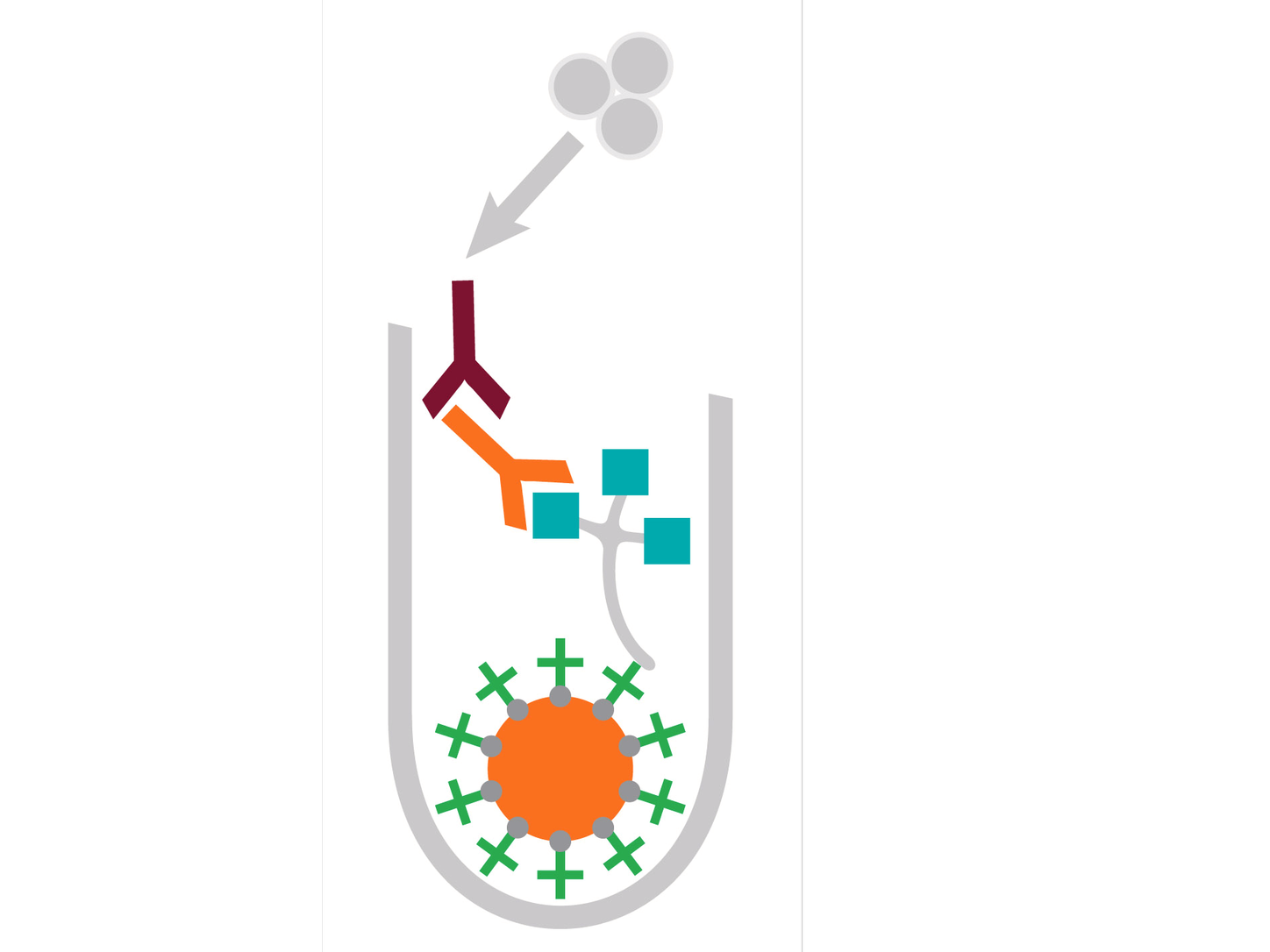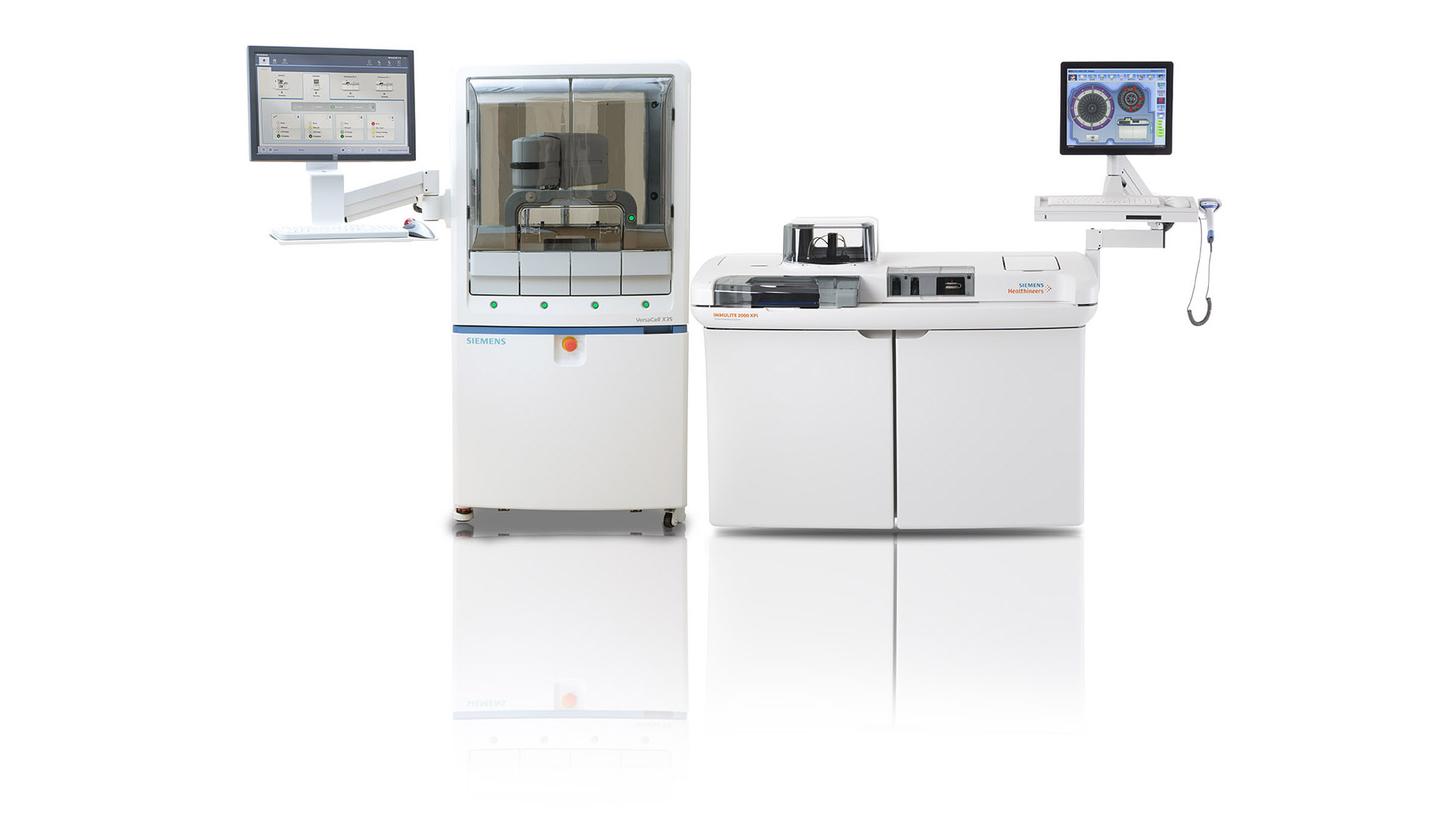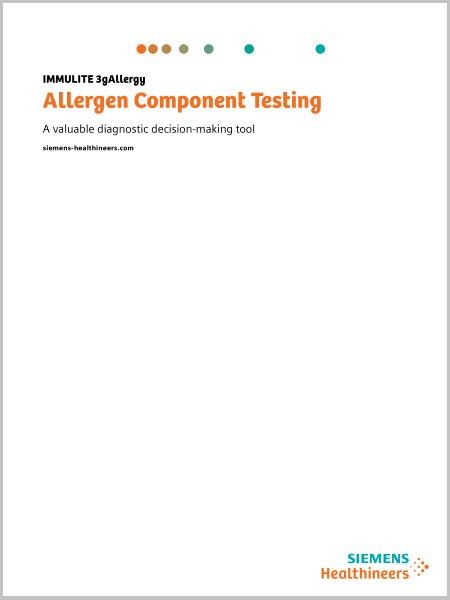- Hjem
- Laboratory Diagnostics
- Assays by Diseases and Conditions
- Allergy
- Making allergy testing routine

Making allergy testing routine
Consolidate your specialty, allergy, and general testing with one of the industry’s most reliable solutions
The prevalence of allergic diseases has continued to increase in the industrialized world for more than 50 years and worldwide sensitization rates to one or more common allergens among school children are approaching 40–50%.1 A clinical history of skin, gastrointestinal, or respiratory symptoms suggestive of allergy often leads to allergen-specific IgE testing.
The IMMULITE® 2000/2000XPi 3gAllergy™ Specific IgE assay helps to enhance patient care with reliable results from a simple blood test that uses quality extracts thoroughly evaluated for potency and allergenic composition.
With the IMMULITE 2000/2000XPi Immunoassay System, scaling your allergy and specialty test offerings feels routine.
3gAllergy Specific IgE assay components

IMMULITE Allergy Wedge
- Specific allergens and mixed allergen panels: When an allergic patient is tested, a reactive result may indicate a response to a specific allergen or a mix of allergens. Specific allergens and mixed allergen panels require the Universal Kit.
- Universal Kit: All specific allergens and mixed allergen panels run with the Universal Kit to provide a result from the patient sample. One master curve applies to all specific allergens and mixed allergen panels.
Increase confidence in allergy results
The 3gAllergy Specific IgE assay uses third-generation chemiluminescent technology and proprietary liquid allergens that preserve their native conformational structure, maximizing binding and resulting in standardized, quantifiable results for informed decision making.
3gAllergy Specific IgE assay sequence

Serum and liquid-specific allergens incubate with anti-ligand-coated polystyrene bead.

Ligand-labeled liquid allergens bind to serum IgE antibodies and to the anti-ligand-coated bead.

Alkaline phosphatase-conjugated monoclonal anti-IgE is added and binds to serum IgE.

A chemiluminescent substrate is added, and light is emitted to provide a quantitative IgE result.
Improve operational efficiency
Improve productivity with a patented, high-capacity allergen wedge
Each allergen wedge can be customized with up to six user-defined, bar-coded allergen vials. As many as 23 wedges plus a universal reagent wedge fit on each carousel, for a total capacity of up to 138 allergens onboard at any time and a total of 5520 test capacity.
Minimize waste and eliminate errors
Reagent onboard stability of 90 days minimizes waste. Bar-coded allergens eliminate errors. All allergen information is scanned from the wedge.
Extensive allergy menu
Extensive menu of ~500 allergens, panels, and components across animals, drugs, dust, foods, grasses, insects, mites, molds, occupational, parasites, trees, and weeds.

Seamless connectivity with VersaCell X3 Solution for a multidisciplinary total lab solution.
Dependable versatility to meet changing demand quickly and easily
Connects to Siemens Healthineers automation with VersaCell® X3 Solution to simplify laboratory operations and maximize productivity
- Sample management automation reduces manual sample touchpoints and labor and standardizes lab processes.
- Seamlessly integrates pre- and post-analytics to enable total lab automation of up to three instruments in customizable configurations.
- Connects to Aptio® Automation for completely automated processes that maximize workflow.
Run allergy testing with your routine and specialty immunoassays on the IMMULITE 2000 XPi Immunoassay System
Integrate allergy into your routine and specialty immunoassay testing
Consolidating multiple tests on a single, easy-to-use, and compact analyzer—including allergy and a wide range of specialty offerings—the IMMULITE 2000 XPi Immunoassay System makes it simple to scale your capabilities without disrupting regular, day-to-day operations.
- Fast turnaround time of 65 minutes.
- Ready-state functionality allows operations to resume according to your defined workflow.
- Automated daily maintenance with AutoStart provides high reliability with minimal operator intervention.

Seamless connectivity with VersaCell X3 Solution for a multidisciplinary total lab solution.
Dependable versatility to meet changing demand quickly and easily
Connects to Siemens Healthineers automation with VersaCell® X3 Solution to simplify laboratory operations and maximize productivity
- Sample management automation reduces manual sample touchpoints and labor and standardizes lab processes.
- Seamlessly integrates pre- and post-analytics to enable total lab automation of up to three instruments in customizable configurations.
- Connects to Aptio® Automation for completely automated processes that maximize workflow.
Run allergy testing with your routine and specialty immunoassays on the IMMULITE 2000 XPi Immunoassay System
Integrate allergy into your routine and specialty immunoassay testing
Consolidating multiple tests on a single, easy-to-use, and compact analyzer—including allergy and a wide range of specialty offerings—the IMMULITE 2000 XPi Immunoassay System makes it simple to scale your capabilities without disrupting regular, day-to-day operations.
- Fast turnaround time of 65 minutes.
- Ready-state functionality allows operations to resume according to your defined workflow.
- Automated daily maintenance with AutoStart provides high reliability with minimal operator intervention.

Seamless connectivity with VersaCell X3 Solution for a multidisciplinary total lab solution.
Dependable versatility to meet changing demand quickly and easily
Connects to Siemens Healthineers automation with VersaCell® X3 Solution to simplify laboratory operations and maximize productivity
- Sample management automation reduces manual sample touchpoints and labor and standardizes lab processes.
- Seamlessly integrates pre- and post-analytics to enable total lab automation of up to three instruments in customizable configurations.
- Connects to Aptio® Automation for completely automated processes that maximize workflow.

One of the largest reference labs in Latin America is making allergy testing routine with the IMMULITE 2000 XPi Immunoassay System
"Our technicians love the IMMULITE 2000 XPi Systems. The systems are easy to operate, easy to maintain, and require minimal sample reprocessing.”

DB Diagnosticos Laboratory, Brazil
"With VersaCell X3 Automation, we can perform more tests with faster processing and minimal manual labor. The IMMULITE 2000 XPi Systems enable us to simultaneously process allergy samples and other immunoassay tests on one platform. Connecting the IMMULITE 2000 XPi Systems to VersaCell was a really good decision for us.”

DB Diagnosticos Laboratory, Brazil
Educational resources
Each year in June, the World Allergy Organization (WAO) raises awareness about allergic diseases and their impact through the World Allergy Week initiative. We are committed to the care of allergic patients and WAO’s initiative to raise awareness by providing a variety of resources to help keep you informed of the latest topics in allergy diagnosis and testing.

Webinar: Specific IgG diagnostics in hypersensitivity pneumonitis
Learn from Dr. Johannes Grosch as he explores the pathophysiology of HP and the diagnostic criteria according to current guidelines.

Webinar: Cross-reactive carbohydrate determinants and their relevance to in vitro allergy diagnostics
Webinar: Cross-reactive carbohydrate determinants (CCDs) and their relevance to in vitro allergy diagnostics
Join Dr. Friedrich Altmann as he discusses the different types of glycosylations, their relevance in allergy, and the impact of CCDs on liquid- and solid-phase in vitro diagnostic technologies for allergy.

Webinar: Diagnostic approaches to determining food allergy versus food sensitivity/intolerance
Webinar: Diagnostic approaches to determining food allergy versus food sensitivity/intolerance
Join Dr. Erwin Gelfand as he discusses different diagnostic approaches to confirm food allergies and differentiate them from food sensitivity/intolerance.

Webinar: Allergy basics—mechanisms of disease and testing options
Webinar: Allergy basics—mechanisms of disease and testing options
Join Dr. Jim Aguanno, an expert in allergic diseases, as he reviews the mechanisms of allergic disease, and the importance of and need for allergy testing.

MLO article: Cross-reactive carbohydrate determinants — history and relevance in allergy diagnostics
Cross-reactive carbohydrate determinants — history and relevance in allergy diagnostics
MLO: The story of cross-reactive carbohydrate determinants (CCDs) is a fascinating journey that spans over 30 years of research and takes us on a global adventure.

Literature Compendium: Allergy Testing
Literature Compendium: Allergy Testing Volume 1
A selection of published studies on the clinical utility of allergy diagnostic testing with a focus on IMMULITE 3gAllergy Specific IgE assays, including comparison to other in vivo and in vitro allergy tests.

White Paper: Allergen Component Testing
White Paper: Allergen Component Testing

Clinical Brief: Predicting Peanut Allergy in an Unbiased Allergy Clinic Population Using Peanut-specific IgE Levels Measured in Two Independent Assays
Clinical Brief: Predicting Peanut Allergy in an Unbiased Allergy Clinic Population Using Peanut-specific IgE Levels Measured in Two Independent Assays
This clinical brief describes research findings from a prospective cohort study conducted at the National Jewish Health hospital in Denver, Colorado.

Allergy test menu
IMMULITE 1000/2000/XPi Immunoassay Systems Allergy Menu
Extensive menu of ~500 allergens, panels, and components across animals, drugs, dust, foods, grasses, insects, mites, molds, occupational, parasites, trees, and weeds.
Pawankar R, Walkter Canonica G, Holgate ST, Lockey RF, Blaiss MS. Executive summary; WOA white book on allergy. 2013. World Health Organization. Available from: https://www.worldallergy.org/UserFiles/file/ExecSummary-2013-v6-hires.pdf
The products/features (mentioned herein) are not commercially available in all countries. Due to regulatory reasons, their future availability cannot be guaranteed. Please contact your local Siemens Healthineers organization for further details.
